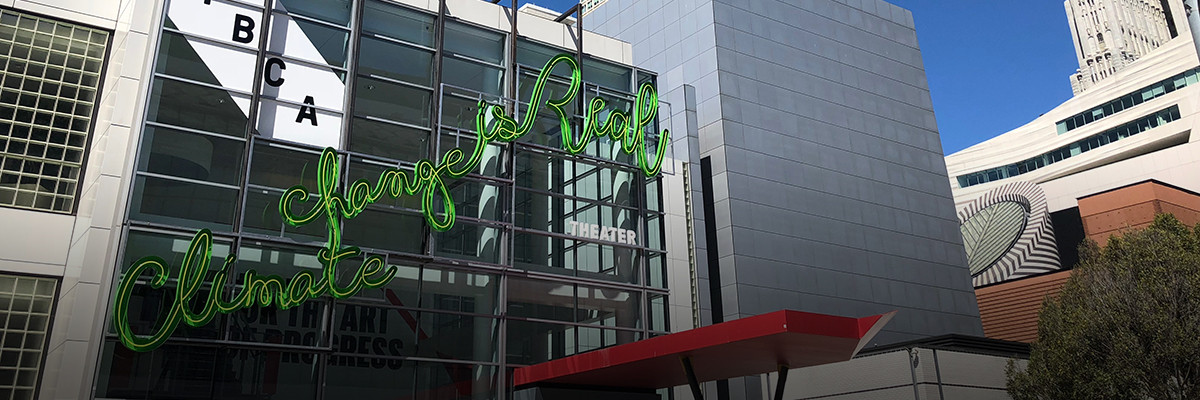
Over the past couple of weeks, the New American Road Trip traversed the United States, with zero emissions vehicles making the trek from the Global Climate Action Summit to UNGA/Climate Week in New York City.
These events come at a crucial time. The intersection of business and society is a busy place. Companies are navigating a complex set of profound changes: the related challenges of urgent climate action, erosion of human rights protections, and innovations reshaping the world of work, not to mention ongoing reminders of the need to ensure that women are able to thrive in society without fear of discrimination, or worse. All this comes when faith in business and the global economy remains low, and when the competitive pressures in a changing economy are intense.
The New American Road Trip reminds us of the opportunities that all this change is creating for companies that dive headlong into the future. Crossing North America in an EV that didn’t require hourly recharging was unimaginable a decade ago and has shown how even our most familiar cultural icons are being remade.
The Global Climate Action Summit two weeks ago served a very important purpose. As intended, the Summit catalyzed a number of significant new climate commitments. More businesses—now nearly 500 in all—have committed to science-based targets; nearly a 40 percent increase from the number a year ago. A coalition of foundations committed US$4 billion in new commitments to combat climate change. And the lead Summit host, California Governor Jerry Brown, committed his state—the fifth biggest economy in the world if it were a nation-state—to achieving 100 percent climate neutral power by 2045. No entity of such size has made such an audacious commitment to date.
Crucially, the human dimension of our changing climate was also at the core of the action in San Francisco. We welcome this: BSR has released four reports that explore the intersection of climate and other sustainability issues: supply chain management, health, inclusive economies, and women’s empowerment. We also launched, along with Mars and Coca-Cola, the Climate Resilient Supply Chain Leaders Platform, which will grow in the coming months as large global companies aim to engage their business partners in creating business solutions—and human protections—in light of a less predictable operating environment.
I also had the opportunity to explore the human dimension of climate change in dialogues organized by the B Team with leaders from business, labor, and civil society, as well as other changemakers, to ensure that the just transition is firmly on the climate agenda. Attention must be paid to those displaced by the clean energy transition.
Action to address the social impacts not only of climate, but of the other massive changes remaking our world, will be essential if we are to reach the Sustainable Development Goals.
Action to address the social impacts not only of climate, but of the other massive changes remaking our world, will be essential if we are to reach the Sustainable Development Goals (SDGs); however, I always approach UNGA Week with a bit of a divided soul. While it is inspiring to be in the company of a global community committed to the vision of the SDGs, it is equally concerning that we seem to be speaking primarily to ourselves at a time when there is massive discontent and such a lack of public trust. For the sustainability agenda to resonate outside the community of people who come to New York this week, it is essential that it deliver economic opportunity for those who are being left behind by the many changes remaking the economy.
For global companies, this means going beyond discussions of the future of work to the creation of solutions. There is both an imperative to address those living in poverty and a need for commitments to economic opportunity and security in the global north. The productivity gains coming from technology and innovative business models will not come to full fruition if they don’t also address the needs for skill development, basic social protections, and lifelong learning.
The New American Road Trip was a great way to remake a 20th century social ritual. But the question before us is bigger than that. In light of the many changes redefining the economy, from climate to technology to longer lifespans, we need to redefine the social contract, and business has a crucial role to play in this.
The innovators that answer these questions will define the 21st century, and the time has come for us to do so.
In New York, there is increased recognition of this need, which I find encouraging, but there is not yet enough of a commitment to next steps. The SDGs remain front and center for all of us who are here, and there is growing recognition of the link between economic security and climate action. But it is what we choose to do after we leave that will determine the extent to which we are able to make our ambitions a reality.
BSR’s latest sustainability insights and events straight to your inbox.
Let’s talk about how BSR can help you to transform your business and achieve your sustainability goals.
